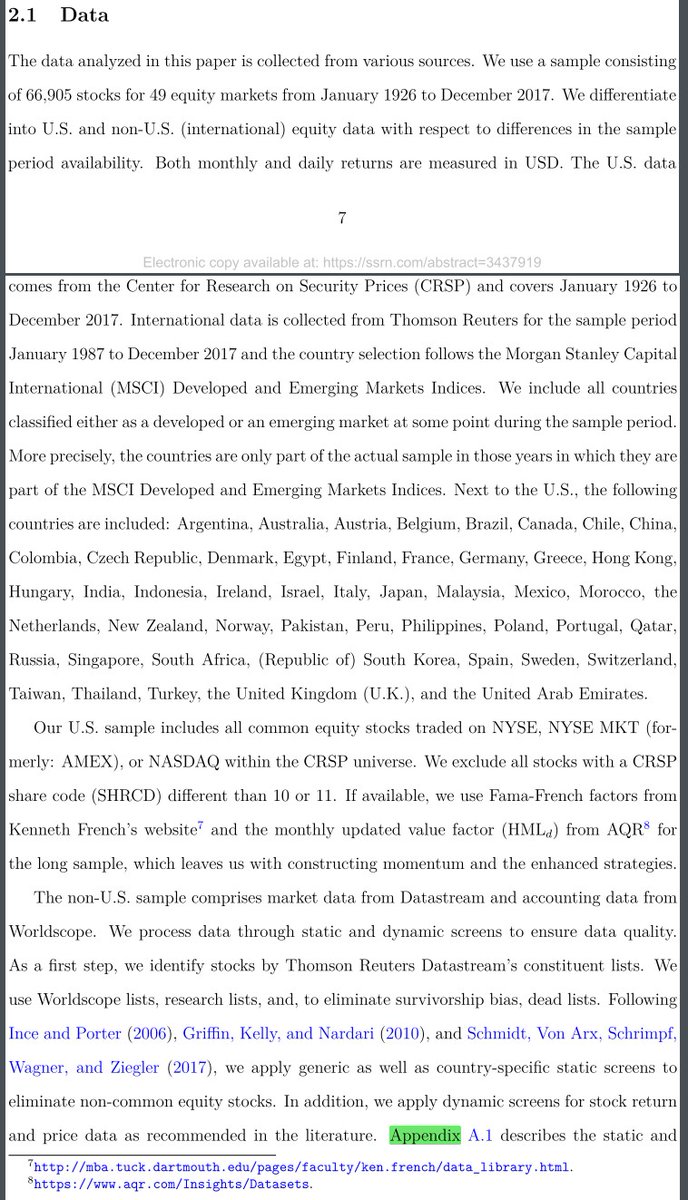
1/ Market Maturity and Mispricing (Jacobs)
"In contrast to the widely held belief, mispricing associated with the 11 L/S anomalies underlying our composite ranking measure appears to be at least as prevalent in developed markets as in emerging markets."
papers.ssrn.com/sol3/papers.cf…
"In contrast to the widely held belief, mispricing associated with the 11 L/S anomalies underlying our composite ranking measure appears to be at least as prevalent in developed markets as in emerging markets."
papers.ssrn.com/sol3/papers.cf…

2/ Caveats: "Emerging markets appear to be comparatively under-researched. This likely has led to a better understanding of which factors truly have predictive power in more mature markets, and the Stambaugh, Yu, and Yuan mispricing score could be partly based on such variables." 







3/ "Ranks are standardized to be uniformly distributed over the interval (0,1] in each country-month. A stock's composite rank is computed as the arithmetic average of its anomaly ranks.
"I rely on yearly (not quarterly) accounting data due to limited data availability."



"I rely on yearly (not quarterly) accounting data due to limited data availability."




4/ "There is strong evidence for return predictability. Inefficiencies appear to be at least as large in developed markets as they are in emerging markets.
"Smaller (larger) countries with fewer (more) firms tend to dominate the 'country average (composite)' measure."



"Smaller (larger) countries with fewer (more) firms tend to dominate the 'country average (composite)' measure."




5/ "Inferences from the baseline analysis carry over to robustness tests. Virtually all alphas are economically and statistically significant. The difference between the alpha obtained in developed markets and that obtained in emerging markets is positive (10 to 61 bps/month)." 



6/ "Our tests indicate greater mispricing after switching from being classified as an emerging market to being classified as a developed market.
"In sum, findings obtained from the within-country variation in market development support the results from cross-country variation."

"In sum, findings obtained from the within-country variation in market development support the results from cross-country variation."


7/ "Market participants in developed markets are more surprised by information contained in the earnings announcements of mispriced stocks.
"Analysts overestimate the earnings of overpriced stocks and, in developed markets only, underestimate the earnings of underpriced stocks."


"Analysts overestimate the earnings of overpriced stocks and, in developed markets only, underestimate the earnings of underpriced stocks."



8/ "Firm characteristics, in particular return R², explain a sizeable fraction of the mispricing difference between developed & emerging markets.
"Anomaly spreads across & within countries appear to be positively related to firm characteristics that may proxy for noise trading."



"Anomaly spreads across & within countries appear to be positively related to firm characteristics that may proxy for noise trading."




9/ "There is little evidence IFRS adoption yields reliably lower mispricings.
"This may suggest that aggregate mispricing is hardly affected by disclosure quality; such differences between emerging & developed markets may not necessarily imply strong differences in mispricing."


"This may suggest that aggregate mispricing is hardly affected by disclosure quality; such differences between emerging & developed markets may not necessarily imply strong differences in mispricing."



10/ Caveats: "Our composite mispricing measure is purely cross-sectional and thus does not allow us to draw inferences about market-wide overpricing or underpricing.
"Most of the large cross-country variation in return predictability is still unexplained.
"Most of the large cross-country variation in return predictability is still unexplained.

11/ "It is still an open question as to what extent institutional investors' sentiment-induced demand shocks, investment constraints, or agency conflicts (DeVault, Sias, Starks; Edelen, Ince, Kadlec; Lakonishok, Shleifer, Vishny) contribute to mispricing in developed markets."
12/ More:
Global Factor Premiums
Do Factor Premia Vary Over Time? A Century of Evidence
Factor Performance 2010-2019: A Lost Decade?
Is There a Replication Crisis in Finance?
Global Factor Premiums
https://twitter.com/ReformedTrader/status/1198106865315405830
Do Factor Premia Vary Over Time? A Century of Evidence
https://twitter.com/ReformedTrader/status/1183099984285073408
Factor Performance 2010-2019: A Lost Decade?
https://twitter.com/ReformedTrader/status/1245559396714729473
Is There a Replication Crisis in Finance?
https://twitter.com/ReformedTrader/status/1371235486988001281
• • •
Missing some Tweet in this thread? You can try to
force a refresh

























